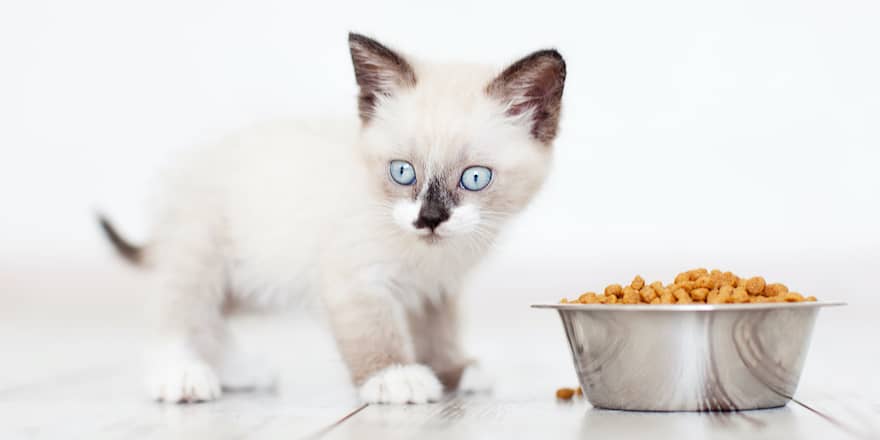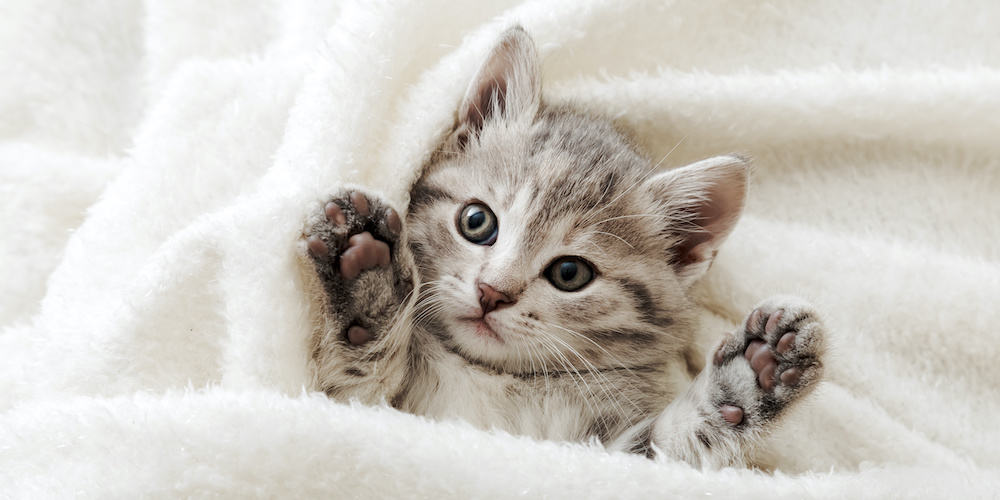Why special kitten kibble?
No one would miss that a kitten is… very small. In a relatively short time, it will grow and become a strong cat.
To achieve this harmonious development, a suitable diet is necessary. You don’t feed a kitten like an adult cat!
Kitten growth
Between 3 and 6 months, a kitten will triple its weight. This period is intense for its body. Its needs for proteins and minerals, particularly calcium, as well as energy, are at their maximum.
A rich and balanced diet will provide the essential nutrients for the development of the skeleton, muscles, brain, and various organs.
The benefits of kitten kibble
Maternal nursing meets the kitten’s needs during the first 2 months of its life. At the end of the 1st month, you can start food diversification by providing the first kitten kibble.
This complete food will provide the kitten with the necessary proteins and minerals for growth. The size of the kibble will also be suitable for its small jaw and tiny dentition.
Besides their complete composition, kibble has many advantages such as easy storage. You can thus leave them available for free grazing so kittens can nibble at any time.
Kibble also ensures good oral health. The mechanical action of chewing acts like brushing and strengthens the jaws and teeth.
Finally, kibble is a cost-effective food. And environmentally friendly by using certain meat products not commonly used in human food, such as offal.
Do not forget to leave clean water available for animals receiving kibble. Special kitten milk can also be used as a source of hydration during the first 3 months.
Good to know! Special kitten kibble is also suitable for the diet of pregnant and lactating females.
The criteria to consider
The composition of the kibble is a crucial element. But it’s also necessary to consider the kitten’s development. Around 6 months, castration or spaying is a key step in feline nutrition.
The composition of kibble
A cat is a strict carnivore. “In the wild,” it primarily consumes small prey (mice, birds…). Unlike dogs, which eat a bit of everything…
Felines must, therefore, receive a diet with a high protein content. However, not all proteins are equal in nutritional quality. For cats, proteins must be of animal origin: meat, fish, eggs, milk.
Kitten kibble differs from adult kibble due to higher protein and calcium content. They are also more digestible because the kitten’s enzymatic system is not yet optimal.
For kittens, the usual recommendations are as follows in % of dry matter:
- Proteins: 30% minimum, including 0.10% taurine, an essential amino acid for cats
- Fats: 9% minimum, including 0.5% linoleic acid, a fatty acid essential for brain and retina development
- Calcium: 1%
- Phosphorus: 0.8%
- Vitamin D necessary for bone growth: 750 IU/kg of food
Kitten’s age and breed
A kitten’s growth ends around 8-9 months. Its energy needs decrease. It is then necessary to switch to adult cat food, or risk the pet gaining too much weight.
However, some large breed cats, like the Maine Coon, have a much longer growth period. For them, special kitten kibble remains necessary until about 12 to 15 months of age. There are also growth kibbles specifically adapted for Maine Coons.
Some manufacturers differentiate between first-age food (1 to 4 months) and second-age food (4 to 12 months). The first corresponds to a strong growth peak and provides energy and highly digestible nutrients in quantity.
The size of the kibble is designed for these very small kittens. The second type is more suitable for growth that is already slowing down. The size of the kibble increases.
And after sterilization?
Sterilization typically occurs at 6 months of age. It involves removing the testicles in males and the ovaries in females. In some animals, this can induce a change in metabolism.
The consequence is increased appetite and a tendency to gain weight, even leading to obesity. In the long term, this can have detrimental effects on the cat’s health, with an increased risk of diabetes, liver disease, and arthritis.
After the operation, the kitten is not yet an adult, but its dietary needs change. To avoid harmful weight gain, it is generally recommended to switch to food for sterilized adult cats, even if the animal has not yet reached the ‘regulation’ age.
Developed by some pet-fooders, the kibble for sterilized kittens from 6 to 12 months is an interesting alternative. With a reduced fat content, they help control weight after castration while providing the necessary ingredients for the end of growth.
Should kitten kibble be mixed with canned food?
Nowadays, the trend is to abandon all-dry kibble diets for cats. Indeed, this very dry food (about 10% moisture content) is likely to promote urinary issues in cats that do not drink enough alongside their intake.
Therefore, it is recommended to have a mix of wet food (pâté, mousses, meatballs…) and dry food. Canned food is given in the morning and evening, while kibble is available throughout the day.
You can accustom your kitten to this mix from a young age to avoid any neophobia, which is the refusal of a new food like canned food for a kitten fed exclusively on kibble.

Where to buy kitten kibble?
At veterinarians
At your veterinarian, you will find premium brands suitable for kittens. Veterinary ranges allow for monitoring the animal throughout its life, from kitten to senior. And even adapt to its health condition in case of illness.
In pet stores
The ranges are vast and generally similar to those in veterinary clinics. It is not always easy to navigate the varied compositions of the bags.
In supermarkets
Quality is not always guaranteed. Avoid low-cost kibble responsible for urinary problems in cats.
Online
Danger ahead! You can find everything on the web, including misleading advertisements! There are now online stores offering exclusively veterinary ranges where you can order without worry. Consult your veterinarian.
In summary
Quality kitten kibble :
1. Contains animal-based protein with a minimum rate of 30%
2. Has a calcium content around 1%
3. Is preferably first stage if the kitten is under 4 months
4. Is suited to its sexual status (sterilized or not)
5. Mixes with wet food
6. Preferably bought in specialized outlets



